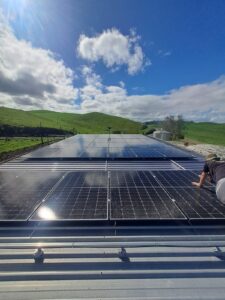
25kW – 72 Solar Panel Dairy Farm Install
A 25kW, 72 solar panel system for a Whakamaru dairy farm. Check out some flyover videos of the solar installation.
Sometimes, after purchasing or leasing your lifestyle block, you will have to consider what you will do with it. If you decide that you will be farming animals, i.e. horses, cattle, sheep, goats, alpacas, etc., you will have to plan how you will subdivide your property if that has not already been done. The subdivision has to be such that it suits your requirements. Don’t make compromises as they may be regretted later.
The simple reason is that if fences are not protected by electric wires, animals push and chew on them etc. In other words, they damage them. To protect your fences and prolong their life, electric fencing is used. At the same time, you protect your animals from leaving the property. If you have purchased a property where the existing fences are only average you can prolong their life by putting up an electric wire.
What is Required for an Electric Fence?
The choice of the energiser depends on whether you have access to mains power or not. If you do the selection is relatively easy. For every 10 km of the fence (max. 3 wires), you require one output joule. This is if the fence is relatively clean. For overgrown fences allowances have to be made. If there is no mains power available a battery-powered energizer is a solution. There are three types available:
The solar-powered energisers are certainly the most convenient of the three. You do not have to change or charge batteries. This type of energiser also makes sure that your fence is powered at all times. The respective choices are under the heading Energisers on this website.
The wire that carries the power must be well insulated. This makes sure that the voltage remains constant along the whole fence. Agri Solar has 5-inch wood post poly tape insulators that can cope with most circumstances. They are made from the highest grade, high-density polyethylene, are UV protected to resist weathering even under harshest conditions and are designed for easy attachment to any type of fence post or wire.
When you select your insulators, start with the post type. Then select the right insulator based on requirements (close to the post or extenders) or type of wire. The shape of the terrain also has an influence (dips, top of a hill etc.) on your selection.
For permanent fencing, high tensile wire is recommended. For temporary fencing poly wire, poly tape or poly rope may be used.
The rule of thumb is that small units with less than .5 output joules require only one 2m earth stake (galvanised rod). For very short fences or strip grazing, a smaller pin may do the job. Units exceeding one output joule should be earthed with three stakes or more as required.
For more details see Electric Fencing for Dummies.

A 25kW, 72 solar panel system for a Whakamaru dairy farm. Check out some flyover videos of the solar installation.

1. Find out where there are telecommunication cables or phone lines on or near your electric fence. This includes both buried and overhead wires and cables. They almost always run along or near the roadside reserve or along driveways. A marker post or grey connection pillar should be nearby. If